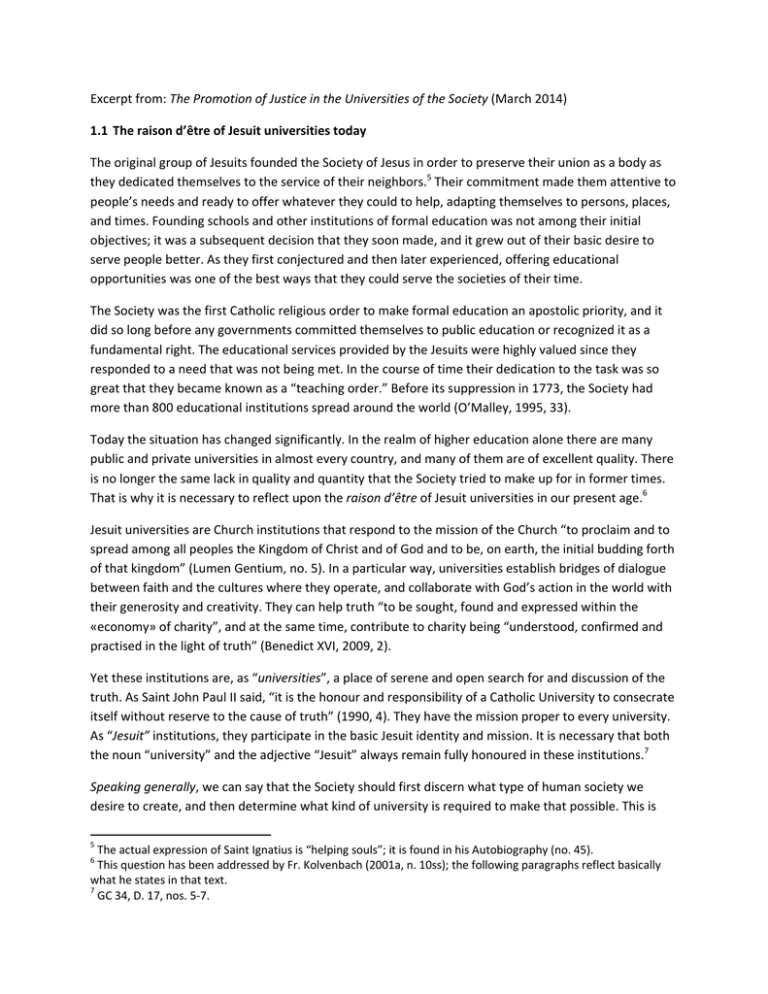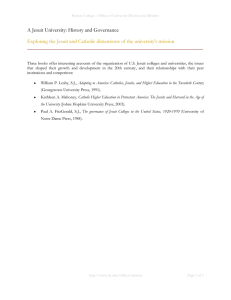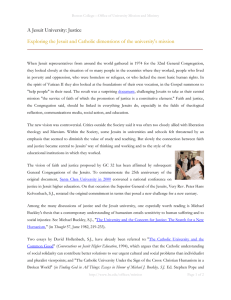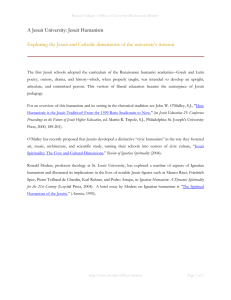The Promotion of Justice in the Universities of the Society The original group of Jesuits founded the Society of Jesus in order to preserve their union as a body as 1.1 The raison d’être of Jesuit universities today
advertisement

Excerpt from: The Promotion of Justice in the Universities of the Society (March 2014) 1.1 The raison d’être of Jesuit universities today The original group of Jesuits founded the Society of Jesus in order to preserve their union as a body as they dedicated themselves to the service of their neighbors.5 Their commitment made them attentive to people’s needs and ready to offer whatever they could to help, adapting themselves to persons, places, and times. Founding schools and other institutions of formal education was not among their initial objectives; it was a subsequent decision that they soon made, and it grew out of their basic desire to serve people better. As they first conjectured and then later experienced, offering educational opportunities was one of the best ways that they could serve the societies of their time. The Society was the first Catholic religious order to make formal education an apostolic priority, and it did so long before any governments committed themselves to public education or recognized it as a fundamental right. The educational services provided by the Jesuits were highly valued since they responded to a need that was not being met. In the course of time their dedication to the task was so great that they became known as a “teaching order.” Before its suppression in 1773, the Society had more than 800 educational institutions spread around the world (O’Malley, 1995, 33). Today the situation has changed significantly. In the realm of higher education alone there are many public and private universities in almost every country, and many of them are of excellent quality. There is no longer the same lack in quality and quantity that the Society tried to make up for in former times. That is why it is necessary to reflect upon the raison d’être of Jesuit universities in our present age.6 Jesuit universities are Church institutions that respond to the mission of the Church “to proclaim and to spread among all peoples the Kingdom of Christ and of God and to be, on earth, the initial budding forth of that kingdom” (Lumen Gentium, no. 5). In a particular way, universities establish bridges of dialogue between faith and the cultures where they operate, and collaborate with God’s action in the world with their generosity and creativity. They can help truth “to be sought, found and expressed within the «economy» of charity”, and at the same time, contribute to charity being “understood, confirmed and practised in the light of truth” (Benedict XVI, 2009, 2). Yet these institutions are, as “universities”, a place of serene and open search for and discussion of the truth. As Saint John Paul II said, “it is the honour and responsibility of a Catholic University to consecrate itself without reserve to the cause of truth” (1990, 4). They have the mission proper to every university. As “Jesuit” institutions, they participate in the basic Jesuit identity and mission. It is necessary that both the noun “university” and the adjective “Jesuit” always remain fully honoured in these institutions.7 Speaking generally, we can say that the Society should first discern what type of human society we desire to create, and then determine what kind of university is required to make that possible. This is 5 The actual expression of Saint Ignatius is “helping souls”; it is found in his Autobiography (no. 45). This question has been addressed by Fr. Kolvenbach (2001a, n. 10ss); the following paragraphs reflect basically what he states in that text. 7 GC 34, D. 17, nos. 5‐7. 6 the crucial question that must be addressed as we discern our mission, a question that the universities should continually ask themselves. The fact is that, since the beginning, our institutions have successfully provided integral formation to persons who would hopefully become leaders in the processes of growth and modernization in the cities and nations where they lived. The universities were forming persons who worked for a better society. More precisely, the Society’s education since the 16th century has been characterized by the four qualities of what is today known as the Ledesma‐Kolvenbach educational paradigm, namely utility, justice, humanism, and faith.8 The quality of utility provides persons “advantages for practical living.” In the 16th century, a good education was clearly necessary and useful for the successful performance of certain professions. Nowadays a quality education is indispensable for helping people to be productive citizens whose labor provides them the wherewithal to live decently. University education has traditionally been motivated by this element of utility insofar as it provides people with the intellectual tools they need for pursuing a worthy profession. The danger is that a purely utilitarian understanding of education may lead to theof the values most needed for the building of a just society—or even contempt of them. Jesuit universities cannot be solely satisfied with simply transmitting instrumental knowledge. When nothing more than this is done, education easily lends itself to injustice and exclusion. It ends up providing knowledge, resources, and power to those who are well off, and these are in turn hired to defend the interests of those who have even more. It is therefore necessary that Jesuit education include, besides utility, the three other qualities that the Society has tried to impart from earlier times as well as today. As a principle promoting the common good, justice enables students to contribute to the “proper governance of public affairs and the appropriate formulation of laws.” When the Society was beginning its educational work, nations were governed by monarchies that required a competent bureaucracy. In modern times, democracies require responsible citizens who participate in public affairs, promote equal opportunity, and commit themselves to working together for the common good. Humanism is another quality of Jesuit education, a feature that seeks to elevate human beings by bestowing “decorum, excellence, and perfection on their rational nature.” It aims at human flourishing promoting values such as compassion, modesty, temperance, wisdom, fortitude, etc., it seeks a better life for all people and fosters the welfare of other sentient beings and the planet. Humanism is understood nowadays under the horizon of an integral formation and a sense of being related to humanity as a whole. In a world where a large section of people are excluded due to caste, race, gender and ethnicity, humanism recognizes the dignity of every human being. For this reason it makes use of means and instruments that contribute to the dignity and development of all persons. 8 These four characteristics utilitas, iustitia, humanitas and fides were spelled out by Diego de Ledesma in the 16th century, and they were taken up again by Fr. Kolvenbach, whose letter provides more information in this regard (Kolvenbach, 2001a, 314). The quality of faith consisted initially of the “defense and propagation of the Catholic faith” at a time when the religious dimension of human reality was not in doubt but rather was taken for granted in all aspects of life, including the educational. At the present time the faith aspect of Jesuit education seeks to offer students an experience of transcendence by showing them the possibility of being opened toward God as their final end. It is an understanding of faith that promotes love of neighbor and rejects religion as tool of negation, exclusion, and discrimination against those who are different. It will also offer hope for the poor.






